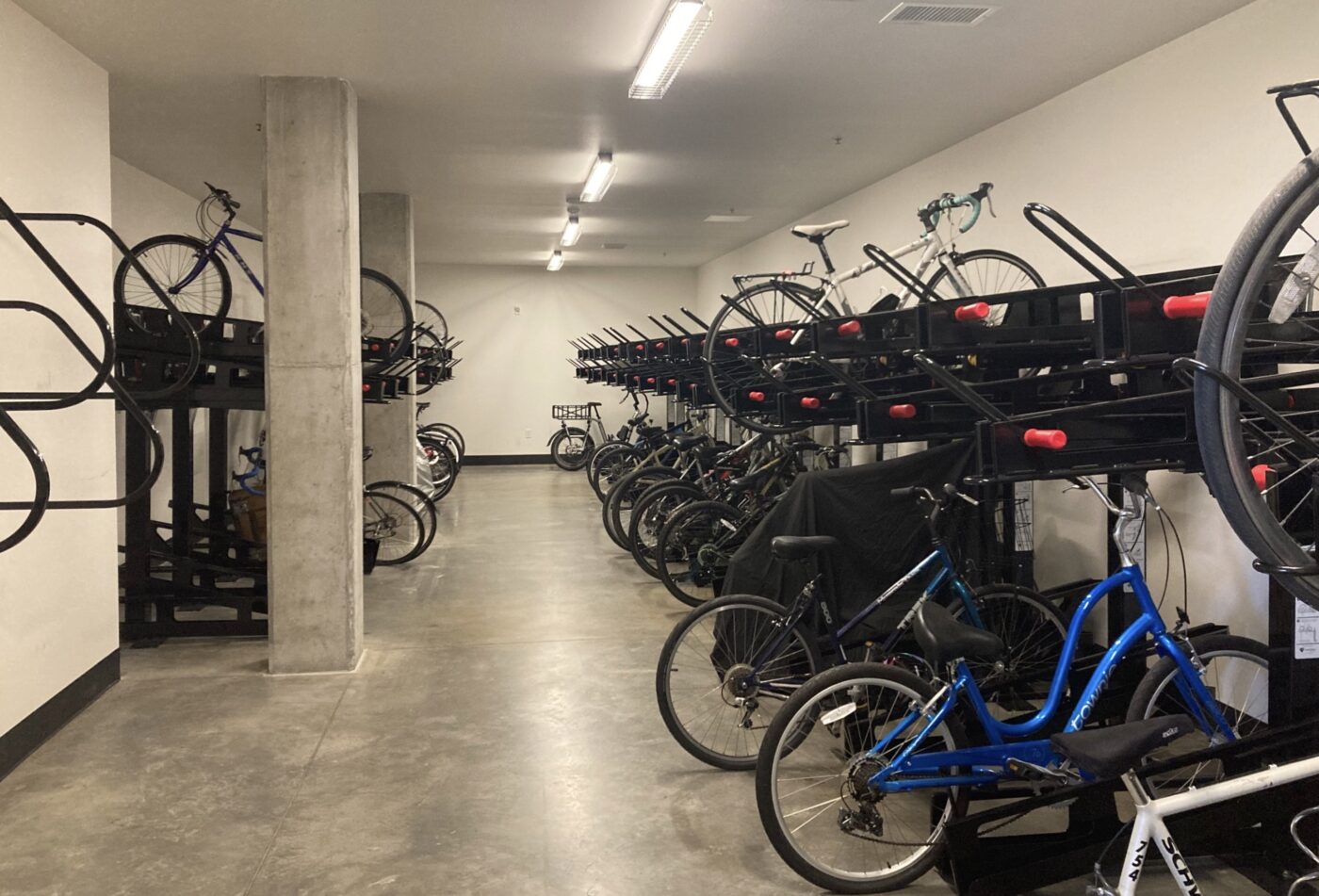Portland City Commissioner Carmen Rubio is expected to slash bicycle parking regulations in a bid to bring down the cost of housing production. Rubio’s proposal will come at a City Council work session being held this morning.
As we reported back in March, Rubio, the commissioner-in-charge of the Bureau of Development Services and the Portland Housing Bureau, is facing pressure to increase the pace of new housing construction to make housing more attainable to more people and meet goals set by Oregon Governor Tina Kotek. After surveying developers and other people involved in the housing permit process back in February, Rubio’s office found that a raft of new bicycle parking requirements in city code passed in 2019 were among the top things driving housing production delays and costs. Over a third of the 600 survey respondents chose bike parking requirements as a top-five issue standing in the way of more quickly producing housing.
In documents shared by Rubio’s office in advance of today’s work session (below), they say six specific regulations can increase the cost of build housing in Portland by as much as 15% — or roughly $60,000 per unit. Those regulations include: System Development Charges (SDCs) 3-7% of project cost; ground floor active use, 1-4% of project cost; tree mitigation fees; public infrastructure; design review, 1% of project cost; and bike parking, which they say can account for 3-6% of project cost for apartments.
Those 2019 bicycle parking regulations were passed in a bid to encourage more Portlanders to choose bicycles over cars. They included stronger security measures, racks that fit a wider variety of bikes (like cargo bikes and recumbents), an increased minimum space requirement, and more.
According to Transportation Commissioner Mingus Mapps’ Senior Policy Advisory Shannon Carney, the fact that bike parking policy is considered a big driver in the cost of housing is “unfortunate.” Carney told BikePortland via email this morning that Mapps will have a lot of questions for Rubio and her staff at the work session today.
According to Michael Andersen, a senior housing and transportation researcher at Sightline, Portland’s bike parking code could stand to be adjusted and it wouldn’t have a huge impact on how many people decide to ride. “Right now (I am told) new apartment buildings are dedicating quite a lot of internal space to bike parking rooms that are going half-empty and/or gathering little-used junker bikes. That’s of little use to anyone,” Andersen wrote in an email to BikePortland last month.
He also said the city can’t simply eliminate mandatory bike parking, because recently passed state law requires it. Oregon law says all cities in metro areas must have at least one, “convenient, covered, secure, and well-lit” bike parking space per home in a new building. Portland code requires 1.1 bike spaces per unit in most of the city and 1.5 per unit in the central city.
“The city can scale back its mandates to 1 per unit and remove rules that the bike parking be indoors, or that it have e-bike charging or cargo bike space or a certain amount of horizontal bike parking. It can stretch the definition of ‘convenient’ to include hooks in rooms,” Andersen added. “I think Portland’s in-unit bike parking design standards are a good example of how a seemingly innocuous requirement can have unanticipated costs.”
Andersen said Portland’s current requirement that in-unit bike parking be located inside a closet or alcove within 15 feet of the door, “can add significant complexity to an architectural design.” “Each additional regulatory requirement has near-zero cost in many cases, but also slightly increases the chance that you have one of these small changes that ripples through the rest of the design and drives costs up a lot.”
The good news for bicycling is that, according to Andersen, many Portland developers — especially in areas with a lot of demand for cycling — have a strong financial incentive to provide quality bike parking regardless of what city code requires. “That’s because auto parking is enormously expensive, and they can bring homes to market at hundreds of dollars less per month if they can make their buildings convenient for people to live in without a car.”
Carney with Mapps’ office says they will have some counter-proposals ready. “Commissioner Mapps is also planning to offer some solutions that don’t include rolling the city’s bike parking policies back to 1998,” Carney shared.
Stay tuned for a recap of today’s work session.
UPDATE: Here’s the recap of the work session.



